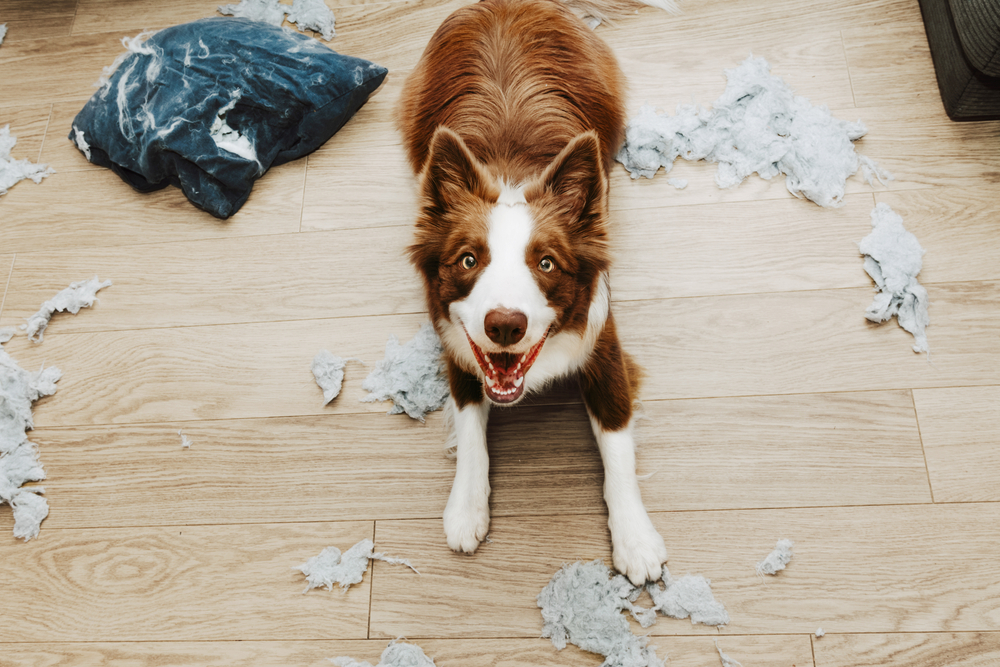When you first bring your puppy home, they’re going to need training in a variety of different ways.
Puppy biting is very normal behavior when they’re young. However, if you’ve never had or trained a puppy before, you might be curious to know: Why is my puppy biting me aggressively?
In this article, I will cover some key information about why your puppy is biting you, including methods you can try to train your puppy out of.
So, let’s get started.

Why Do Puppies Bite
When your puppy plays with you, it’s fairly normal for them to bite and chew on your hands.
However, those little teeth can be as sharp as needles, and understanding why it happens is the first step to training your puppy out of biting you. Your puppy bites for a variety of reasons. These include but are not limited to:
Lack Of Mental Stimulation Or Exercise
Puppies have a lot of energy to burn off in short bursts. That being said, if your puppy becomes bored due to a lack of mental stimulation or exercise, they might resort to biting you aggressively.
If they don’t have enough toys to play with or you leave them alone for long periods of time, then this is likely to result in biting behavior.
Puppy Teething
Similar to human babies, puppies go through a teething process. When your puppy reaches 3 months old, your puppy will start to lose their baby teeth and you will find them around the house.
The discomfort of teething can actually encourage your puppy to bite, as it provides them with some form of relief.
Hunger
If your dog is hungry or is on a calorie-restricted diet, then they might be biting and chewing your hand to try to find other means of nutrition.
Stress And Anxiety
Your puppy might be biting due to something that causes stress or anxiety.
This could include a variety of situations, including separation anxiety or being kept near another animal that they don’t get along in a confined space such as a car.
Puppies can even feel stressed when they are hounded by small children consistently.
Normal Chewing Behavior
Chewing is normal for dogs, no matter their age. Puppies are curious and playful creatures, and spend a large majority of their time playing, exploring, and chewing new and exciting things that they encounter with their mouths.
Puppies can chew for stimulation, for fun, and even to relieve the symptoms associated with anxiety. That being said, while it is normal for your puppy to chew, this can lead to destructive behaviors.
For instance, they might resort to chewing the furniture or anything they can find if you don’t provide them with a variety of exciting and stimulating chew toys.
However, it’s important that your dog learn what is okay and what is not okay to chew in a gentle and constructive manner.
So, How Do You Fix Your Puppy Biting You
There are many different methods you can train your puppy to stop biting you. Provide your puppy with enough mental stimulation and exercise
To prevent your puppy from biting, you will need to make sure that you walk your puppy, with the duration of their walks correlating with their age. If you need to leave your puppy alone for a period of time, you will need to make sure he gets out for a good play session before you go.
You should also make sure that you spend time training them, and allowing them to engage in playdates with other dogs from a young age to ensure that they are well-socialized.
This will help to minimize the biting behavior. In addition, you should provide your dog with plenty of their own toys and inedible chew bones.
To ensure that they remain entertained throughout the day, introduce something new or rotate your dog’s chew toys every couple of days so that he doesn’t get bored with the same old toys.
Toys that squeak will entertain them and help to satisfy their urge to chew.
Provide Sufficient Teething Solutions
While puppies do need to chew on something to ease their teething pain, your hand is not a good chew toy. You should gently redirect them to chew on their toys.
In addition, you can try easing their teething pain by giving puppies dog toys that can be frozen, ice cubes, or you can even try freezing wet washcloths for them to chew.
It’s ideal to introduce something new or rotate your dog’s chew toys every couple of days so that he doesn’t get bored with the same old toys.
Provide Your Puppy With Chews
As well as toys, you can redirect your puppy’s biting behavior towards inedible chews made for puppies less than 3 months old.
When they get slightly older, you can start introducing edible chews. That being said, chews should not have pieces that can break off easily. These pieces can pose a choking hazard to a puppy.
Reduce Stressful And Anxiety-Inducing Events
Puppies can feel anxious and stressed in a number of situations. For instance, if they are being wound up by children, this might cause them to bite as a result of this.
It’s important to stay in tune with your dog and their behavior, and notice when a certain situation makes them stressed. To reduce this behavior, try to avoid exposing your dog to situations that make them nervous or upset.
More Tips To Stop Your Puppy From Biting
Use A Time Out
You can try giving your puppy a time out as soon as their teeth touch your skin. Let out a noise, immediately walk away, and ignore them for around a minute. If they continue to bite and nip, walk away and leave them for a further minute.
Avoid Using Physical Punishment
If you hit your puppy for biting, they will likely also respond with aggression. In fact, approaching them with physical punishment is much more likely to result in the opposite effect of them biting even harder.
In addition to this, if you hit your puppy, they might learn to become afraid of you, which can also result in even more aggression.
Don’t Discourage Your Puppy From Playing
Being allowed to play is a super important part of your puppy’s development.
Play time with your puppy is essential bonding time that you shouldn’t discourage. It’s important to encourage your puppy to play gently, not discourage them from playing at all.
Avoid Waving Your Hands In Front Of Your Puppy
This is an important one to remember, especially if you have children.
Waving your hands in front of your puppy’s face to encourage them to play is likely to encourage them to bite your hands, and will reinforce to your puppy that this is an acceptable behavior.
Don’t Jerk Your Hands Away From Your Puppy
You should never jerk your hands away from your puppy, as this will encourage your puppy to jump forward and grab at you with their mouths.
In Summary
Puppies can bite for a variety of different reasons. It is important that you teach them that biting is not an acceptable behavior gently and without using physical punishment.
- 8 Signs That Your Dog Is In Heat - November 8, 2022
- Why Is My Dog Whining Whilst Carrying A Toy In Their Mouth? - August 17, 2022
- Reasons Why Your Dog’s Poop Is White And What To Do About It - August 17, 2022








